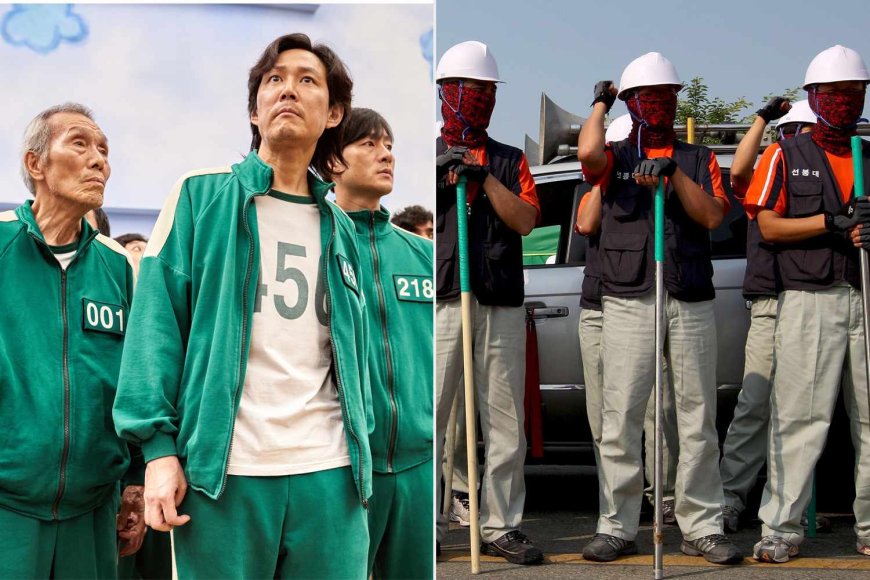Is “Squid Game” a True Story? What to Know About the Violent South Korean Strike That Inspired Player 456's Story
A former Ssangyong employee recognized similarities between the real historical moment and fictional series

A former Ssangyong employee recognized similarities between the real historical moment and fictional series Noh Juhan/Netflix; Jeon Heon-Kyun/EPA/Shutterstock 'Squid Game.' ; Unionized workers of Ssangyong Motor protest during strike on June 16, 2009 in South Korea.:max_bytes(150000):strip_icc():format(jpeg)/Squid-Games-Unionized-Workers-of-Ssangyong-0-062525-6470ba42852a46eebc121726d315e65d.jpg)
NEED TO KNOW
- The third and final season of Squid Game premiered June 27 on Netflix
- Seong Gi-hun's backstory was based on the Ssangyong Motor strike in 2009
- The event in South Korea lasted 77 days and resulted in violent clashes with the police
Squid Game is a dystopian nightmare for its players that derives from real-life events.
The South Korean show's third and final season dropped on June 27 on Netflix. It features the conclusion of Seong Gi-hun (Lee Jung-jae)'s story, a character whose backstory was based on the Ssangyong Motor strike. The series highlights just how much people are capable of sacrificing and enduring for financial gain, a goal that happens via deadly children's games.
In a June 2025 interview with The New York Times, creator Hwang Dong-hyuk said he believes the series became a streaming sensation because "we touched something in the zeitgeist through Squid Game."
"The sense of urgency, the sense of crisis that weighs heavily on people’s daily lives, it allows anyone to easily relate to Gi-hun," he continued. "That I tackled the issues of society’s limitless competition through children’s games, that contrast appealed to a lot people."
Throughout the series, viewers witness Gi-hun's financial and social struggles as his dramatic past is alluded to. While the character's turmoil is a work of fiction, the actual historical moments that inspired it are not.
Here's everything to know about how Squid Game was inspired by true events.
Is Squid Game based on a true story?

KIM JAE-HWAN/AFP via Getty Protestors speaking out about Ssangyong Motors on July 25, 2009 in South Korea.
Squid Game is not based on a true story, but it was inspired by the Ssangyong Motor Strike, a real event from South Korean history that turned violent.
The ordeal was the basis for Gi-hun's origin story. In a 2021 Agence France-Presse (AFP) interview (via NME), Hwang revealed that by referencing the strike, he "wanted to show that any ordinary middle-class person in the world we live in today can fall to the bottom of the economic ladder overnight."
“I think viewers around the world deeply relate to the theme of economic inequality portrayed in Squid Game,” the creator added.
What was the Ssangyong Motor strike?

Kpa/Zuma/Shutterstock Union workers protesting during the Ssangyong Motor Strike on June 27, 2009 in South Korea.
According to Peoples Dispatch, the incident unfolded when China’s Shanghai Automotive Industry Corporation (SAIC) filed for bankruptcy in January 2009.
The company had a controlling stake in South Korea's Ssangyong Motor Company, and the bankruptcy resulted in mass layoffs for Ssangyong.
In the weeks after, about 2,000 workers resigned from the company voluntarily, per The New York Times. Ssangyong then announced in April 2009 that it would cut 36% of its remaining workforce, including all 970 workers from the plant in Pyeongtaek, South Korea. HONG JIN-HWAN/AFP via Getty South Korean riot police clash with striking workers at the compound of the Ssangyong Motors plant on on July 22, 2009 in Pyeongtaek, South Korea.
The following month, factory workers mounted a sit-in that lasted 77 days, which led to violent and fiery clashes with police. Peoples Dispatch called the conflict "among the most fierce workers’ struggles South Korea has witnessed in almost two decades."
When the strike started, there were originally over 900 participants, but that number dwindled after a court order was issued to end the event and the police turned off the factory's water, according to The New York Times.
Workers striking were subjected to rubber bullets and tasers by the police, per The Japan Times.
How did the Ssangyong Motor strike end?

Jeon Heon-Kyun/EPA/Shutterstock Unionized workers of Ssangyong Motor during a protest on June 16, 2009 in South Korea.
After 77 days, the sit-in ended at the plant, which "had virtually become war zone," as The New York Times reported at the time.
A deal between the union and Ssangyong's management was struck, resulting in the company retaining 48% of the factory's jobs. Despite the tension, the union and management signaled that most of the strike participants' roles would be saved.
Still, some employees faced consequences for taking part in the event. According to Labor Notes, the striking workers "were blackballed from employment with other large Korean companies."
Unable to find jobs and having to pay fines for their union activity, they went into financial debt, which resulted in the workers' wages and assets being seized by the courts.
As the outlet reported, "13 Ssangyong workers and family members died by suicide as a result of this anti-union oppression between 2009 and 2011. Between 2009 and 2018, another 30 SsangYong workers committed suicide for similar reasons."
Others also reportedly died from stress-related issues from the fallout, per The Korea Herald.
How did the Ssangyong Motor strike inspire Squid Game?

Ju-han/Netflix Lee Jung-jae as Seong Gi-hun in 'Squid Game' season 2.
The Ssangyong Motor strike inspired Squid Game's main protagonist Gi-hun's storyline.
In the first episode of the series, it is revealed that 10 years ago, Gi-hun was laid off from an assembly job at Dragon Motor, a car manufacturing plant. Dragon Motor is seemingly a nod to Ssangyong, which translates to “double dragons" in English.
Like at the Ssangyong factory, Gi-hun and his co-workers went on strike, which resulted in a violent clash with the police — a scene briefly depicted in episode 5 of Squid Game's first season.
What have the Ssangyong Motor strikers said about Squid Game?

Lee Ki-Tae/EPA/Shutterstock South Korean Ssangyong Motors workers during a rally on May 22, 2009 in South Korea.
In December 2024, Lee Chang-kun, a former Ssangyong Motor employee and union leader who participated in the strike, told The Japan Times that Squid Game's instant streaming success left him feeling "empty and frustrated."
"[When season 1 premiered], it felt like the story of the Ssangyong workers had been reduced to a commodity in the series," he explained. "Many have lost their lives. People had to suffer for too long."
Chang-kun continued, "We were seen as incompetent breadwinners and outdated labor activists who had lost their minds. Police kept beating us even after we fell unconscious — this happened at our workplace, and it was broadcast for so many to see."
As for the show's storylines, in a November 2021 feature for Jacobin, Chang-kun wrote how "the order of games in Squid Game resembles the phases of agony Ssangyong workers had to undergo — indeed, the plot appears to be inspired by the seventy-seven-day occupation." KIM JAE-HWAN/AFP via Getty A South Korean protester hurls a rock at riot police during an anti-government rally supporting striking workers near the Ssangyong Motors plant on July 25, 2009 in Pyeongtaek, South Korea.
"Out of the blue, we were left with no option but to squat at the factory. We first attempted to turn to each other to survive together," he continued. "However, we were thrown into a life-or-death situation, often with no other option but to betray and dupe each other."
Like the characters in Squid Game, Chang-kun recalled how the Ssangyong employees "each had to hurt our closest friends." He added, "By the time the police raided the strike, there were only about 700 of us left, and mistrust of our coworkers nearly outweighed our trust."
While their story may now be more widely recognized globally, Chang-kun told The Japan Times that it hasn't had a significant impact on the South Korean workforce's practices.
"Despite being widely discussed and consumed, it is disappointing that we have not channeled these conversations into more beneficial outcomes," he said.
Was Squid Game inspired by anything else?

Vivien Killilea/Getty Hwang Dong-hyuk attends the 'Squid Game' Guild Screening in Los Angeles on November 8, 2021 in Hollywood, California.
The Ssangyong Motor Strike inspired Squid Game, but so did some pieces of pop culture.
In a September 2021 interview with Variety, Hwang said he also drew ideas from Japanese comics and anime.
"When I started, I was in financial straits myself and spent much time in cafes reading comics including Battle Royale and Liar Game," he recalled.
Hwang continued, "I came to wonder how I’d feel if I took part in the games myself. But I found the games too complex, and for my own work focused instead on using kids’ games."
If you or someone you know is struggling with mental health challenges, emotional distress, substance use problems, or just needs to talk, call or text 988, or chat at 988lifeline.org 24/7.



















































